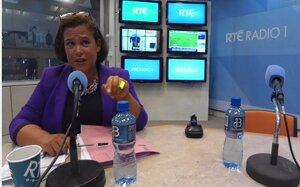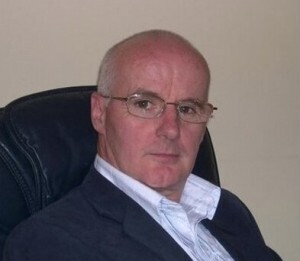
Mary Lou McDonald on Today with Sean O’Rourke this morning.
Those who heard it will not soon forget it.
Mary Lou McDonald appeared on RTÉ Radio One’s Today with Sean O’Rourke this morning to discuss Sinn Fein’s think-in starting in County Meath today.
Or so she thought.
Nobody expects the Spanish Inquisition, but even some members of Broadsheet’s bias weary Transcription Department, responsible for typing thousands of hours of Irish radio and not known for any strong SF sympathies, dropped their shorthand pencils in disgust.
‘sheet head transcriber ‘Hot Ben’ (100wpm) remarked:
“I have transcribed them all but this was in a different league. Yes, worse than Duffy and the Brazilian cop. I’m doing myself out of a job but the words alone do not do it justice…”
Gulp
Grab a tay.
Seán O’Rourke: ” Now, the Party think-in, for what many people regard as the real opposition party in the 32nd Dáil, Sinn Féin, takes place today and tomorrow. Lots to chew over for a party that had, in all fairness, a disappointing election outcome earlier this year, though they might dispute that, given that they gained a lot of seats, but relative to their expectations, they might have expected a lot more.
That was then followed by a Brexit vote that prompted calls for a united Ireland border poll, plus cross-border intrigue in the NAMA/Project Eagle Affair, and more questions about the party leader, is it time for Gerry Adams, after thirty-three years as President, to think about moving on to fresh pastures? Mary Lou McDonald, vice-president of Sinn Féin, good morning to you…”
Mary Lou McDonald: “Good morning, Seán.”
O’Rourke: “I suppose, story of the day, we better start with NAMA, again, it’s an issue where you have two very respected organs of the State just differing completely on whether the taxpayer should have lost out on up to €200 million on that Northern portfolio.”
McDonald: “As well Seán, what the Comptroller and Auditor General’s report does is bring to almost to a crescendo all the noise that there has been around Project Eagle and NAMA now, for a very, very long time. I’d have to take issue with you when you refer to NAMA as a respected organ of the State…”
O’Rourke: .”..well, led by a very respected individual in Frank Daly…
Mary Lou: “…albeit because of the conflicts and the controversies and the processes surrounding the sale of this property portfolio, which bear in mind at the time was the single largest transaction undertaken by NAMA, and all the circumstances around it, not least the valuation issue, and so on that the C&AG has reiterated, place a very, very serious question mark over NAMA, place a serious question mark over Frank Daly, and his judgement and his actions, or his inactions, and raise the most serious questions for Minister Michael Noonan.”
O’Rourke: “Well, what would the questions for Michael Noonan be?”
McDonald: “The fundamental question is this: when it was brought to his attention that the initial bid had been corrupted, that there was to be fixers’ fees, that a portion of those fixers’ fees were to go to someone that had been appointed by the Dublin government to the Northern committee. When all of that was called to his attention, he should have called a halt, he should have called a stop and Richard…”
O’Rourke: “But again, what does “calling a halt” mean, because again, the Pimco thing was stood down, that was the original arrangement.”
McDonald: “Pimco, NAMA says they were told to get out of town, Pimco says they withdrew, in any event they were off the pitch, but it didn’t resolve the problem that the process had been corrupted, entirely corrupted. That an individual that had been appointed by the government in Dublin, not by anybody in the North, who sat on a committee which was not a talking shop, it had four NAMA board members, Frank Daly himself chaired this committee, it had the head of asset management and recovery on it, that that individual had been implicated in an arrangement with a bidder that was about to succeed…”
O’Rourke: “…yes, and he declared that, they stood down, Pimco, he proposed…
McDonald: “He, he… sorry,”
O’Rourke: “He did not declare it, Pimco brought this to the attention of NAMA, because Pimco were obliged to, because of anti-corruption legislation and regulations in the United States, that’s how all of this came to light.”
O’Rourke: “Yes, but Cushnahan had declared his involvement in an advisory role with some of NAMA’s debtors.”
McDonald: “He did, and doesn’t that beg the question, and just take a common-sense view of this, you are on a committee that is there to give strategic advice to the NAMA board in respect to a very, very large, very valuable property portfolio, an individual recommended in the North, but appointed by the government in Dublin, states that they have an active relationship with seven debtors making up more than 50% of that board…”
O’Rourke: “Why?”
McDonald: “…why was he on the committee?”
O’Rourke: “ Why, equally, in view of what you say, did the C&AG say, under the heading of “management of conflicts of interest”, make no findings against the actions of individuals or third-parties?”
McDonald: “Because it is not the role or the function of the C&AG to do that, the C&AG is very clear about what they can and cannot do. Make no mistake about it, this is not a story that happened in the murky, tribal underworld of Northern Ireland, this story comes right back to the doorstep of Dublin, right back to the doorstep of government, NAMA is a creature of Fianna Fáil initially, and of subsequent governments, NAMA is accountable to the Minister of Finance here…
O’Rourke: “Yeah, but…”
McDonald: .”..and most crucially, it is the taxpayers in this jurisdiction that pick up the tab.”
O’Rourke: “One of the things we heard from Richard Curran, was his view, his sense, that NAMA saw Northern Ireland as somewhat of a hornet’s nest to do with politics, also a small area in which to do business, the construction industry, the legal profession, all a very small world, and perhaps against a backdrop of being told to do their business quickly, as a chance to get a reasonable deal, very quickly. Now, that may not be the case, but if it is the case, surely they were vindicated by the actions of your party members in that Committee in Northern Ireland…”
McDonald: “Listen. You could say for the whole island of Ireland, that it is a small community, that the business establishment, that the movers and shakers are small in number, that the professional experts that support and give advice are small in number, so I don’t think that argument holds any water.”
(talk over each other)
O’Rourke: “You had to say goodbye, you had to throw a guy under a bus, in Mr. McKay, chair of that finance committee, who it turned out, was coaching a witness before it, in a way that was designed to shaft the then-First Minister of Northern Ireland. What could be more of a hornet’s nest than that?”
McDonald: “Firstly, Daithí MacCaithigh was not thrown under a bus…”
O’Rourke: “…well, he’s out of the [Northern Ireland] Assembly.”
McDonald: “Daithí admitted that what he did was a catastrophic error of judgement, it was wrong, and he did the correct thing and resigned. That should not have happened under any set of circumstances, it’s most unfortunate that he did, but Daithí took the rap for that…”
O’Rourke: “…the man he was coaching said knowledge of this in Sinn Féin went to the top.”
McDonald: “The man who says that is entirely wrong. Entirely wrong, and let’s…”
O’Rourke: “And let’s just come across something that the Irish News had reported, it was one of these contacts between McKay and the blogger, Bryson, was brought in. “A wee suggestion for your closing paragraph, when talking about Robinson, refer to him as Person A, so say all you have to say about him referring to him as Person A. Then in your final line, say ‘Person A is Peter Robinson MLA’. Means that the committee cannot interrupt, and means you don’t have to say Robbo’s name until the last second.””
McDonald: “Yes, that communication and that level of instruction should never have happened…”
O’Rourke: “…doesn’t it prove, doesn’t it prove, that if NAMA’s stated reason for selling it all in one fell swoop was the hornet’s nest theory, as put forward by Richard Curran, that they were absolutely on the money?”
McDonald: “Absolutely not, absolutely not, let’s not be naive, now, or silly, are you trying to suggest to me that there haven’t been other instances in this fine, upstanding jurisdiction, where people, chairs of committees, have been talking to people in circumstances that were inappropriate? I’m not defending, neither does Daithí MacCaithaigh, his actions and to extrapolate from that that NAMA therefore acted correctly is frankly off the wall…”
O’Rourke: “It was most certainly not! It proves, it proves certainly that Northern Ireland was a different place for doing business. I know it’s part of a small, all-island, and I know you have a particular view, but it was a matter of the quicker they got out of Dodge, the better for the portfolio?”
McDonald: “It’s not just that I have a different view, if you look at a succession of scandals that have beset this state, and have cost its taxpayer very, very greatly, one of the things about the Public Account Committee and the banking inquiry is, time and time again, the very same characters, the very same legal firms, the very same accountancy firms, auditing firms, feature strongly, so the networks right across that country are small, we shouldn’t suffer from delusions of scale. We live on a very small island.”
O’Rourke: “No, no, what I’m saying is, in all of this stuff, Sinn Féin is just the same as the rest of men and women.”
McDonald: “We are of course, we are made up of just ordinary men and women like any other political party…”
O’Rourke) “…and you’re perfectly capable of conniving and setting out to shaft people, and that was a classic example.”
McDonald: “What we are not, is a political party that is driven and craven by power at any cost, and we are not driven by self-interest self-aggrandisement, and personal & political corruption.”
O’Rourke:: “And who are you talking about there in that particular context, are you talking about Michael Noonan, are you talking about Enda Kenny, who are you referring to when you make that kind of sweeping statement? Power at any cost?”
McDonald: “Go back, go back and look at any of the various tribunals or the inquiry if you have any of the patience, or the heart, to do all of that…”
(talk over each other)
McDonald: “…then tell me that we haven’t had a political culture in this State that is deeply corrupted, deeply compromised, and I think for people looking on now, whether it’s the issues around Apple, the issues around NAMA…”
O’Rourke: “Yeah, but we don’t have time to get into…”
McDonald: “Yeah.”
O’Rourke: “…a lot of whataboutery that would involve a lot of people losing their lives, a lot of bloodshed on this island, and people involved in your own party.”
McDonald: “I don’t think… it’s a worthy discussion that I’m more than happy to have, I have to say I don’t see its connection with NAMA, I don’t see its connection with the failures of government in this particular instance, and the need now, very smartly, for the PAC to do our work, which we will do, for a commission of inquiry to be established, and the government needn’t imagine that they can dodge that particular bullet in reality at this stage of the game.”
O’Rourke: “What kind of terms of reference do you want to give this commission of inquiry?”
McDonald: “As powerful as possible in terms of compelability, not just of witnesses but of papers, of documents, we do have to have an eye on things like confidentiality that have beset other efforts, we’re very sensible about this of course and we need to take and we need to have access to good legal advice, to get the terms of reference right. It is complicated by the fact that we have two jurisdictions on the island, there’s no point pretending otherwise. I would say that the Finance Minister in the North has written to Michael Noonan and made it clear that his department will collaborate fully with any Commission established here.
So, perhaps if there’s goodwill and if there’s a genuine appetite, on the part of Dublin particularly, and right across the country to get at the truth, I do think it can be done, it does have to be legally proofed and tested, but when the meeting happens today with the Taoiseach, we will be leaving him in no doubt that he doesn’t have a get-out clause now. He’s blocked this, he’s turned his face away from it when I’ve read the C&AG’s report I sort of smiled to myself and said perhaps now we understand why there’s been such a strong resistance to establishing a Commission…”
O’Rourke: “In the event of them taking a u-turn on that, it wouldn’t be the first time a u-turn was ever performed by a politician, it’s like the ones you performed yourselves, you’re accusing Fianna Fáil of performing a u-turn in calling for the abolition of water charges, but again, it took the Paul Murphy by-election win in Dublin South West to get Sinn Féin to concentrate on where it stood regards water charges.”
McDonald: “Well, I’m not, and don’t get me wrong, I wish we had won that by-election, fair play to Paul, he carried the day, but in fact our track record on water charges goes way back before any of that and in fact reaches into the North, where Conor Murphy was in ministerial office and in fact, we put a stop to a very strong Tory attempt to impose water charges in the North.”
O’Rourke: “…prior to that by-election loss, you were telling the Week in Politics that you were going to pay your water charges because you’d a good income, but it’s something you changed your mind on, Gerry Adams was going to pay them on his holiday home.”
McDonald: “I did, and let me tell you, I’m the kind of person that believes that you pay your way, and I pay my taxes, you know the way people say ‘people don’t like paying taxes’, I believe in paying my fair share. And in the case of the water charges, I accepted all along, and accept the reality, is, it’s double taxation. The reality is we took a position for their absolute abolition from the get-go, but in certain circumstances where the charge was being made, and given that I have an income, I don’t, I’m not rich, but I represent the people that struggle, many of them a lot harder than me, my instinct is to pay.
I changed my mind, and I’ll tell you why, nothing to do with a by-election, the constituency I represent is mixed to an extent, we would certainly not be the rich belt of Dublin, and I was struck again and again in particular older people that would rely on me, and rely on us to represent their interests, and to a woman and to a man, not only could not meet these charges but were absolutely petrified at the fact they weren’t in the position to meet them. It wasn’t “won’t pay”, it was “can’t pay”, and what was going to happen to them. So my decision was an absolute act of solidarity with those individuals and our position…”
O’Rourke: “Yes, well…”
McDonald: “…Seán, has been for abolition, for funding of water services and infrastructure through general taxation. That is the correct position. And Fianna Fáil must be dizzy at this stage, the number of u-turns that they’ve taken. It is, however, welcome, that they’ve come around, belatedly, to the common-sense, obvious position, and we’ll be bringing forward a motion to the Dáil to seek the abolition of those charges.”
O’Rourke: “Okay, now. I mentioned Gerry Adams, your party leader. Thirty-three years, coming up on that in a week’s time. How long more should he continue?”
McDonald: “Gerry is the leader of the party, because he is the party’s choice to be the leader. Often on the airwaves, when you hear people rehearsing this minor obsession, you’d be forgiven for thinking he somehow imposed himself on a resistant membership, that’s not the case. Every year, we elect our leadership at the Ard Fheis, Gerry is the preferred and absolutely supported leader of the party. That’s the size of it. Yes he is, he’s in that position a long time, but I think rather than criticising…”
O’Rourke: “…oh, it is, his resilience is extraordinary, surpassed by very few people, Robert Mugabe, or other undesirables, maybe, not suggesting they should necessarily be compared, I’m just wondering is there any bit of succession planning happening in Sinn Féin.”
McDonald: “Well, look at our teams, North and South, you made reference to our last Dáil election, look at the team we now have in the Dáil. Not that I’m throwing roses at us, but I regard our team in the Dáil as very vibrant, talented and committed. There is an abundance of talent, and that’s reflected in the North, it’s reflected in our membership base, we have no shortage of young people coming through…”
O’Rourke: “At the same time, at the same time, an increase in the number of seats, 24, up from 14, but shouldn’t you have got more, especially considering the bad odour that Fianna Fáil are still in, just one Dáil term after they were catastrophically reduced to 20 seats in 2011, and also, the way things have gone for the government in the last five years. Sinn Féin was never going to get a better opportunity and will never get a better opportunity…”
McDonald: “I disagree with you, the political scene is still replete with opportunity for us. Would I have preferred 24 to be 34? You bet I would.”
O’Rourke: “So, why wasn’t it? By common consent, and sometimes common consent is a dangerous basis on which to make any kind of argument, Gerry Adams did not have a good election. He’s just unsure of himself on economic questions, and I suppose there’s that distrust as to whether he can be believed by the electorate.”
McDonald: “Listen, just on the numbers issue, first, just so you know, internally, in the party, we never had any notion that we were going to sweep the boards and come back with thirty or forty seats. Sometimes the polling date is suggested, and that’s possible. When the campaign kicks in, in our case sometimes you face some fairly robust media criticism and hostility from certain quarters, not far from all, things can change. Caoimhín O’Caoláin, he’s still a serving member of the Dáil, an elder lemon, I hope he doesn’t take offence to that, if he’s listening, but bear in mind. Caoimhín was there on his own, then we were five, then we were four, and we have incrementally built. For us, and for me, that’s more important, we have to have something that is durable, we have to have a vehicle that is genuinely a voice for working people…”
O’Rourke (interrupting): “Yes, but here’s the point – why would somebody lead, he’s longer the leader of Sinn Féin than Pat Hickey is in the Olympic Council of Ireland! Surely there’s a question of people losing their touch when they’re in a job for so long.”
McDonald: “Well, I don’t think Gerry has lost his touch…”
O’Rourke: “You don’t (inaudible) signs of that in the election, do you not?”
McDonald: “His political record is there for all to see, and perhaps this differentiates him from other party leaders. Perhaps it’s that we’ve set about a course of social and economic justice and prosperity, it’s also about peace, and it’s also about Irish unity. So, Gerry’s commitments to seeing those objectives become a reality…”
O’Rourke (feigning exasperation): “But how long more are you going to…”
McDonald: “Hold on. It’s about more than a career calculation, this is who Gerry is.”
O’Rourke: “But how long more is this burden going to have to be carried by him?”
McDonald: “I think he has made clear that he is going to continue for as long as the party wish him to lead, and as long as he is in a position to lead. I’ll tell you this much Seán, Sinn Féin will decide who leads Sinn Féin. That’s a matter for us as members.”
O’Rourke: “Well, I’m not aware of any other parties that allow outsiders to decide…”
McDonald: “No, but there can be a tendency, very foolishly in my opinion, for parties to take fright, to take a wobble, to imagine it’s good politics, or that it’s wise to respond to a media agenda.”
O’Rourke: “There may be reasons why he has to go on, and he may look forward to a time when he doesn’t have to go on. He’s needed, he’s the guy the keeps the whole show together, North and South, which means that neither you nor Pearse Doherty are in the position to take up that mantle.”
McDonald: “You think that, do you?”
O’Rourke: “I’m just putting it to you as a question.”
McDonald: “Gerry is undoubtedly the glue that has held this party together, he has led magnificently…”
O’Rourke: “That having been said, when will the torch be passed to a new generation?”
McDonald: “When the time is right.”
O’Rourke: “When will that be?”
McDonald: “When the time is right.”
O’Rourke: “When will that be?”
McDonald (annoyed): “When the time is right. That’s when it will be.”
O’Rourke (mockingly): “Is the time not right now?”
McDonald: “No.”
O’Rourke: “Why isn’t it?”
McDonald: “Seán, we had our Ard Fheis, Gerry was returned as the leader, he enjoys our full support as leader. And when the time is right, don’t worry, don’t lose any sleep…”
O’Rourke: “Why is the time not right?”
McDonald: “…I fear you tossing and turning at night about this, Seán, with worries, we will know, Gerry will know when the time is right, you’ll be the first to know, Seán, I’m sure.”
O’Rourke: “I hope you’ll keep that promise.”
Listen here.
Pic Via Today with Sean O’Rourke












